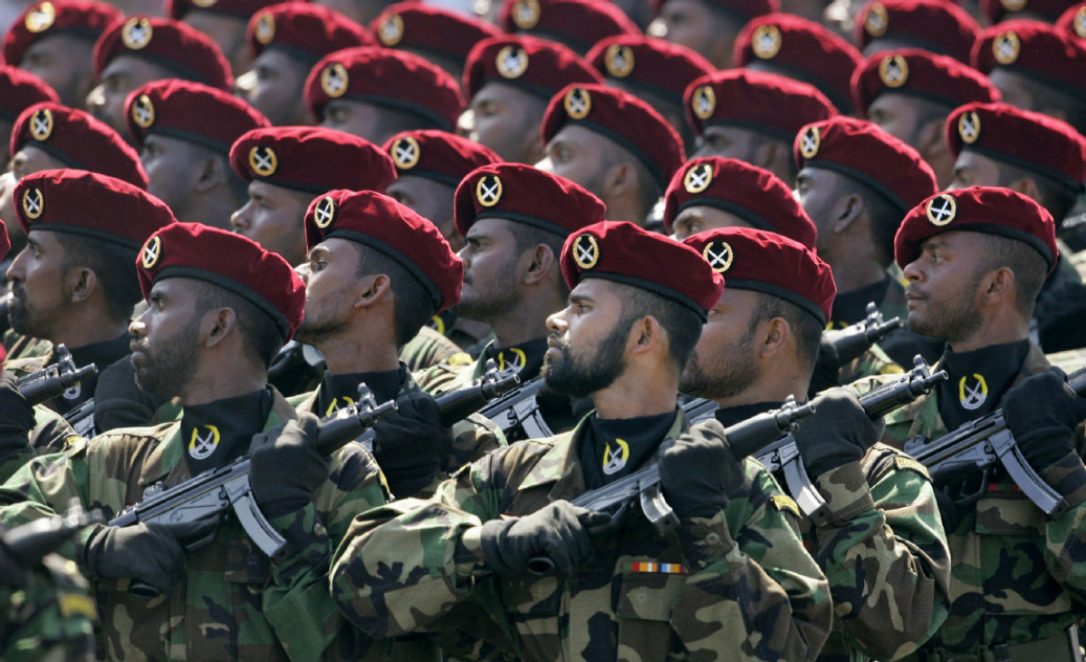Given Sri Lanka’s history in Haiti, its treatment of Tamils on the island, and its history of impunity, its soldiers should not be allowed to wear the blue helmet, writes Liberal MP Gary Anandasangaree.
By Gary Anandasangaree, ‘The Star,’ Toronto, Nov. 3, 2017
The recent appointment of Robert Mugabe as the World Health Organization (WHO) Goodwill Ambassador sent shock waves across the globe.
The Zimbabwean dictator oppressed his people while dismantling his country’s health care system. The outrage was near universal. Prime Minister Justin Trudeau wondered if this was a “bad April Fool’s joke.” The British called the appointment “surprising and disappointing.” Perhaps the only one surprised by the outcry was the embattled head of the WHO, Tedros Adhanom Ghebreyesus.
There are too many examples in recent history of the United Nations turning a blind eye on individuals and countries with appalling human rights records.

Sri Lankan army commandos march during an Independence Day celebration in Colombo. (AP)
The United Nations Peacekeeping Conference taking place in Vancouver on Nov. 14 is a case in point. Many countries being invited to this conference have problematic militaries with allegations of international human rights, including war crimes, crimes against humanity, and genocide. One such country invited this year is the Democratic Socialist Republic of Sri Lanka, whose military has a long record of rights violations.
According to the Associated Press, the Sri Lankan peacekeepers deployed to Haiti between 2004 and 2007 by the UN ran a sex ring operation with nine children, some as young as 12. Some 134 members of the Sri Lankan military were implicated, with 114 of these men being returned to Sri Lanka by the UN without any consequences.
In 2013, a young Haitian woman accused a Sri Lankan soldier of rape. The UN mandated the Sri Lankan military to investigate. Maj.-Gen. Jagath Dias was charged with investigating this incident. General Dias, who himself is alleged to have committed war crimes in Sri Lanka, reported back that the rape allegation was fabricated. He apparently did not even speak to the actual victim in the case.
But Sri Lanka’s record of violations of international law, nor the impunity it affords its soldiers, does not end there. The Sri Lankan armed forces have been the subject of several United Nations investigations. In 2011, the Panel of Experts appointed by then-Secretary General Ban Ki-moon concluded that allegations leveled against the Sri Lankan armed forces during the last phase of the war on the island in 2008 and 2009, if proven, amounted to war crimes and crimes against humanity.
These include indiscriminate bombings of hospitals and no-fly zones, rape and sexual violence, violating the Geneva Convention by conducting summary executions of those who surrendered, enforced disappearances and more. In 2015, the Office of the UN High Commissioner for Human Rights found the Sri Lankan military had indeed committed war crimes and crimes against humanity during the period of the war and beyond.
The Sri Lankan military continues to violate the rights of Tamils in the North and East of the island. The army occupies as much as 60,000 acres of civilian land just in the Mullaithivu district in Northern Sri Lanka, with massive camps that encroach on the daily lives of civilians.
According to a report recently released jointly by Adayaalam Centre for Policy Research and People for Equality and Relief in Lanka (PEARL), the Vanni region, where much of the civilian carnage took place, has one army personnel per two civilians. There are ongoing reports of torture, rape, and suppression of journalists and human rights defenders.
Notwithstanding any of these findings, the Sri Lankan government refuses to hold any military personnel accountable for these crimes. Sri Lankan President Maithiripala Sirisena has recently said that he would not prosecute a single soldier who fought for his country. The Sri Lankan legal system appears unwilling and unable to handle any of these international crimes.
On the other hand, the victims in Sri Lanka continue to live with the military intruding in their daily lives, while they search for justice. Similarly, the poor victims in Haiti are awaiting answers.
It is with this backdrop that Sri Lanka’s invitation to be part of this noble role as International Peacekeeper is very troubling. Peacekeeping is a very complicated undertaking. Many militaries have had checkered pasts relating to peacekeeping, including our Canadian forces in Somalia.
Canada undertook a process of truth-seeking that built the confidence of our military to peacekeeping operations. One of the goals of the Vancouver conference is to promote a gender perspective on peacekeeping. While these are laudable goals and highlight the progress of the United Nations in addressing some of its previous failings, the question of Sri Lanka being invited to this table remains problematic.
Had Sri Lanka embraced a process of accountability and sought truth, a valid argument for engagement could have been made. By inviting Sri Lanka to take part in discussions on peacekeeping without substantive progress on accountability, the UN is validating the island nation on the world stage, thereby sending the message to other despotic leaders and rogue countries that they too could violate the rights of their people without consequences.
Ironically, while the Sri Lankan delegation is in Vancouver, another delegation is in Geneva at the UN Human Rights Council, defending Sri Lanka’s human rights record as part of the Universal Periodic Review. Given Sri Lanka’s history in Haiti, its treatment of Tamils on the island, and its history of impunity, its soldiers should not be allowed to wear the blue helmet, which is often seen as the embodiment of peace and protection of the innocent.
Gary Anandasangaree is the Member of Parliament for Scarborough-Rouge Park.